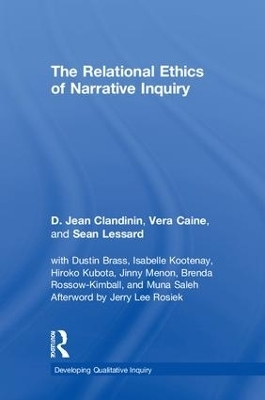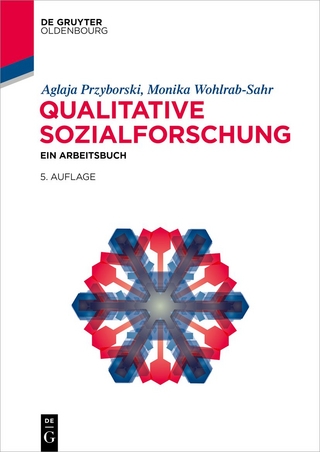
The Relational Ethics of Narrative Inquiry
Routledge (Verlag)
978-1-138-28570-5 (ISBN)
Narrative inquiry is based on the proposition that experience is the stories lived and told by individuals as they are embedded within cultural, social, institutional, familial, political, and linguistic narratives. It represents the phenomenon of experience but also constitutes a methodology for its study. At the heart of this methodology is relational ethics. However, until now the functioning of this key relationship in practice has remained largely undefined. In this book the authors take on the essential task of developing a conceptual framework for the application of relational ethics to narrative inquiry.
Building on a corpus of more generalized research, this book is grounded in a multi-year study with indigenous youth and families. The authors describe their experiences of narrative inquiry, highlighting how relational ethics informed their negotiation of these research relationships. They also engage in a conversation with the work of philosophers who have guided their narrative inquiry to offer a more thorough understanding of relational ethics. Through this, and contributions from five further studies on a diverse range of subjects, a number of key points for successful relational ethics are isolated and expounded upon.
This book is an invaluable tool for researchers and postgraduates engaged in qualitative research — providing clear and practical guidance on ethical concerns. It also extends the work of the authors’ two previous titles, Engaging in Narrative Inquiry and Engaging in Narrative Inquiries with Children and Youth.
D. Jean Clandinin is Professor Emeritus and Founding Director of the Centre for Research for Teacher Education and Development at the University of Alberta and one of the pioneers of narrative inquiry. Vera Caine is a Professor in the Faculty of Nursing at the University of Alberta and a Canadian Institutes for Health Research New Investigator. Sean Lessard is from Montreal Lake Cree Nation in Treaty 6 territory. He is a former schoolteacher. Sean is currently an Associate Professor in Secondary Education at the University of Alberta.
Chapter 1: Looking Backward and Forward to Relational Ethics in Narrative Inquiry
Chapter 2: The Relational Ontology of Narrative Inquiry Shapes Relational Ethics
Chapter 3: The Living and Telling of Narrative Inquiry in the Arts Club
Chapter 4: Brenda Rossow Kimball
Chapter 5: The Relational Ethics of Attending with Wide-Awakeness to the Ongoingness of Experience
Chapter 6: Making Masala: Shaping a Multiperspectival Narrative Inquiry through a Re-search Of and For Storied Images Jinny Menon
Chapter 7: The Relational Ethics of Moving Slowly in Ways that Allow for Listening and Living
Chapter 8: Embracing Tensions through Narrative Inquiry into Experiences of People who are Homeless in Japan Hiroko Kubota
Chapter 9: The Relational Ethics of Engaging with Imagination, Improvisation, Playfulness and World-travelling
Chapter 10: Muna Saleh
Chapter 11: The Relational Ethics of Always Engaging with a Sense of Uncertainty and Not Knowing
Chapter 12: Dustin Brass
Chapter 13: Relational Ethics as Lived Embodiments that Require us to be Still and Attend To, and With, Silence and Contemplation
Chapter 14: Ways of Departure: Contemplating Relational Ethics in Narrative Inquiry
Chapter 15: Living Relational Ethics
Afterword: The Ethics and Politics of Narrative Inquiry Jerry Lee Rosiek
References
| Erscheinungsdatum | 06.05.2018 |
|---|---|
| Reihe/Serie | Developing Qualitative Inquiry |
| Verlagsort | London |
| Sprache | englisch |
| Maße | 152 x 229 mm |
| Gewicht | 453 g |
| Themenwelt | Sozialwissenschaften ► Soziologie ► Empirische Sozialforschung |
| ISBN-10 | 1-138-28570-6 / 1138285706 |
| ISBN-13 | 978-1-138-28570-5 / 9781138285705 |
| Zustand | Neuware |
| Haben Sie eine Frage zum Produkt? |
aus dem Bereich


